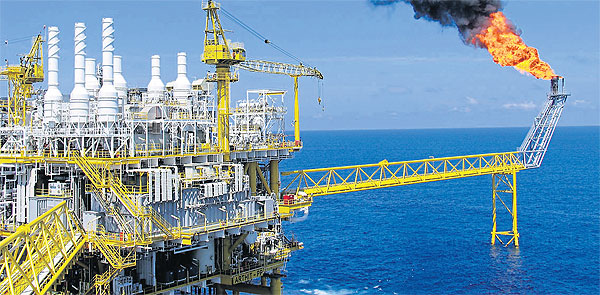
The Energy Ministry has been given 12 months to find ways to manage natural gas concessions that are due to expire between 2022 and 2023.
The National Energy Policy Committee yesterday agreed on a broad guideline under which the government requires higher shares in gas fields, continues with their development to prevent any adverse effect on gas production, and prudently manages benefit sharing for the maximum interests of the country and its people.
The committee, chaired by Prime Minister Prayut Chan-o-cha, also acknowledged preparatory measures by the Mineral Fuels Department to hire consultants to study and appraise natural gas reserves.
Three concessions covering five fields are due to expire in 2022, with one concession for two fields to expire in 2023. They include large concessions for the Erawan and Bongkot gas fields.
Deputy permanent secretary for energy Kurujit Nakornthap said Erawan and Bongkot together supply natural gas of 2.1-2.2 billion cubic feet per day, comprising 76% of natural gas supply from the Gulf of Thailand.
"The government needs to find proper solutions within a year and make decisions before 2017 because private companies are expected to stop their investment in those energy fields five years prior to the expiry date," he said.
The committee yesterday also approved a new power development plan (PDP) for 2015-36.
The PDP aims to produce an additional 57,459 megawatts of electricity by the end of 2036, taking the country's power capacity to 70,335 MW. That excludes 24,670 MW produced by ageing generators that will be cut off at the end of the plan.
The plan was based on GDP growth averaging 3.94% during its course, slightly below the 4.41% growth that was used in the previous PDP in 2010.
The proportion of natural gas to be used in producing power will be cut from 65% to 40%, with clean coal accounting for 20-25% from 19%, renewable energy for 15-20% from 8%, hydropower for 15-20% from 7% and nuclear for 0-5%.
In compliance with the new PDP, the committee approved PTT Plc's investment plan of 78.9 billion baht for three gas pipeline projects.
The committee also approved cutting Thailand's oil reserve for private companies from 43 to 25 days given higher oil supply and convenient oil transport.
The cut will help reduce oil companies' operation costs, which will lead to retail oil prices falling by 9-10 satang a litre.
Power plant developers are unsure whether the country's power security will improve as the PDP will be revised soon after a new government is elected next year, said Pichai Tinsuntisook, chairman of the Federation of Thai Industries' renewable energy industry club.
"If the plan is revised one year after its approval, I do not expect the plan will help change anything," he said.
Plant operators agree with the plan to lower dependence on natural gas to improve energy security in the long term, but the increased proportion of coal-fired power is also a crucial point that will be opposed by non-government organisations.
Mr Pichai said protests could force a new government to amend the plan.
For example, he said, Thailand has had its first renewable energy development plan since 2008, but progress has been far slower than planned due to the instability of government policies.
"I remember when one government added new capacity generated from napier grass in the alternative energy development plan, but the plan was axed immediately once a new government stepped into power," said Mr Pichai.
A developer that proceeded with a napier grass power plant has suffered losses.
Mr Pichai said the government should focus on biomass and biogas as they are good for generating local income and more viable commercially than solar farms and solar rooftops, which require imported materials.